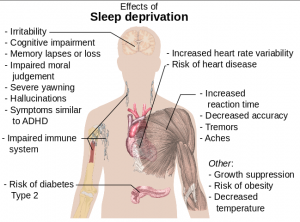The walking dead
Up to 70 million Americans have chronic sleep disorders, according to Harvard sleep medicine neurologist Dr. Josna Adusumilli. And a new study shows that one-third of American’s are sleep deprived. Most adults need about 8 hours of sleep, teens need about 9.5 hours, and toddlers need about 13 hours of sleep including a day-time nap.
Teens are by nature night owls, going to bed late, and waking up late. With early school start times, teens are generally severely sleep-deprived with disruption of their circadian rhythms. Their sleep schedules are out of synch with their circadian rhythms and they are in a state of constant jet lag. This sleep-deprived state adversely affects their executive function and emotional responses, affecting judgement and their emotional reactivity. Behavioral abnormalities, depression, weight gain and A.D.H.D. can be a result of their chronic sleep deprivation.

The many health effects that can be associated with sleep deprivation. Source: Haggstrom, Mikael. “Medical”
Sleep later, score better!
Increasing sleep times by allowing later school start times dramatically results in improved school attendance, grade point average, test scores, and a decreased incidence of depression. Car crashes among these high school students even decreased by up to 70%.
Short-term effects of sleep deprivation
As we age, the quality of our sleep gradually gets worse. Studies show that one’s cognitive and physical performance for an individual who sleeps 6 hours per night for 12 consecutive nights, is similar to an individual staying awake for 24 hours straight, or an individual with a blood alcohol level of .1 per cent. Sleep deprivation has significant effects on our perception, motor skills, and our emotional control. Decision making, learning, memorizing, and analytical skills become impaired, with an increased incidence of accidents and mistakes. These are the short-term effects of sleep deprivation.
Long-term effects of sleep deprivation
Long-term sleep deprivation adversely affects our metabolism and endocrine system, including weight gain, increasing the risk of diabetes and heart disease, increasing the risk of certain types of cancers. Our immune function is decreased and we accelerate cognitive dysfunction and increase the risk of developing dementia. It is felt that prior sleep deprivation may have irreversible effects on health that cannot be regained by catching up later on sleep.
Studies have shown that we are not good judges of knowing how much sleep we require. We frequently underestimate how much sleep our bodies need. Most of us want to be effective and productive in our lives, but by pushing the envelope, expanding the work day, and lessening our sleep time, we become less sharp, less productive, less content, and increase our chances of getting sick.
To learn more about the insidious nature of chronic sleep deprivation, take a look at Maria Konnikova’s article in the New Yorker: http://www.newyorker.com/science/maria-konnikova/the-walking-dead
If you or someone you know is in need of a better night’s sleep, contact us for a no obligation consultation. We are the sleep specialists at Chevy Chase ENT located in the Virginia, Maryland, and Washington D.C. metro area dealing with sleep apnea and sleep-related problems. We can help diagnose your condition, recommend whether a sleep study would be beneficial, and offer you a variety of treatment options including CPAP, Radio Frequency Ablation (RFA) and more.
